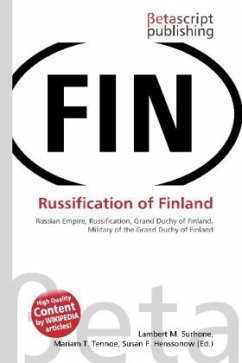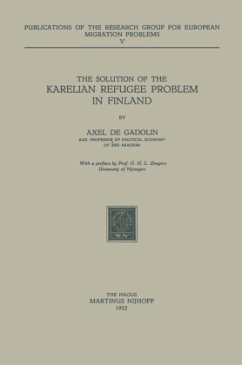
Russification of Finland
Versandkostenfrei!
Versandfertig in 6-10 Tagen
23,99 €
inkl. MwSt.

PAYBACK Punkte
12 °P sammeln!
Please note that the content of this book primarily consists of articles available from Wikipedia or other free sources online. The Russification of Finland (1899-1905, 1908-1917, sortokaudet/sortovuodet (times/years of oppression) in Finnish) was a governmental policy of the Russian Empire aimed at the termination of Finland''s autonomy. It was a part of a larger policy of Russification pursued by late 19th-early 20th century Russian governments which tried to abolish cultural and administrative autonomy of non-Russian minorities within the empire. The Russification campaign resulted in Finni...
Please note that the content of this book primarily consists of articles available from Wikipedia or other free sources online. The Russification of Finland (1899-1905, 1908-1917, sortokaudet/sortovuodet (times/years of oppression) in Finnish) was a governmental policy of the Russian Empire aimed at the termination of Finland''s autonomy. It was a part of a larger policy of Russification pursued by late 19th-early 20th century Russian governments which tried to abolish cultural and administrative autonomy of non-Russian minorities within the empire. The Russification campaign resulted in Finnish resistance, starting with petitions and escalating to strikes, passive resistance (including draft resistance) and eventually active resistance, even to the assassination of the Russian governor-general Nikolai Bobrikov by Eugen Schauman in June 1904. During the Russo-Japanese War with the financial aid from Japan the rebels bought a shipment of thousands of rifles aiming an uprising and forming an independent state.












